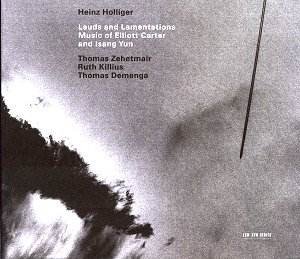Though not unique in musicís history, Carterís status
is quite remarkable. His early works were clearly indebted to some
sort of American Neo-classicism, as befits a Nadia Boulanger pupil.
When about forty, he started re-thinking his music making. He thus
patiently and painstakingly developed a new approach in which his
music became more complex and often quite intricate. True to say
that some of his first mature works are sometimes intractable. However,
over the years, he became full master of his aims and means, and
his music, while still very taxing and demanding, acquired a considerably
greater freedom. This is evident in the attractive Clarinet
Concerto and in the recent works recorded here. The most
substantial piece is the superb Oboe Quartet completed
in 2001. This compact piece in a single span playing for a quarter
of an hour is packed with invention and imagination, and unfolds
almost effortlessly. Though quite demanding, technically speaking,
this very approachable piece is a perfect example of what Carter
can now achieve without ever compromising, but with complete formal
and expressive freedom.
The other pieces, most of them homages of various
sorts, are quite short but vintage Carter. Four Lauds
was not originally conceived as a cycle. The earliest panel Riconoscenza
per Goffredo Petrassi was composed as early as 1984 to
mark the Italian composerís eightieth birthday, whereas the other
panels were all composed between 1999 and 2000. The opening Statement
Ė Remembering Aaron (1999) pays a bold, though friendly
tribute to Aaron Copland whereas Rhapsodic Musings
(2000) is dedicated to Robert Mann on his eightieth birthday.
The cycle is capped by a lively Finale Fantasy Ė Remembering
Roger (1999) paying homage to Roger Sessions. As a whole,
thus, this cycle might be regarded as a sonatina for violin solo
in which Carter unashamedly indulges in instrumental fancy. No
easy stuff, though, but still quite accessible. A 6 Letter
Letter for cor anglais is yet another free fantasy written
for Paul Sacherís ninetieth birthday and quite appropriately based
on thematic material derived from Sacherís name, worked-out with
much imagination and instrumental resourcefulness. The cello pieces
Figment and Figment II Ė Remembering Mr. Ives
(2000) are again short studies exploiting the celloís expressive
and technical range. (Incidentally, I did not spot any direct
allusion to or quote from any of Ivesí music. Maybe, there is
none.)
Isang Yunís Oboe Quartet of 1994
is his last completed work. This is obviously not the work of
a failing mind. Quite the contrary. This substantial work also
plainly demonstrates Yunís full mastery of display in all his
late works in which he achieves his hard-won reconciliation between
Eastern and Western cultures. Old Korean music is never absent
from Yunís mature works, but its presence is suggested rather
than bluntly displayed as a colour effect. The magnificent Oboe
Quartet is no exception. A long meditative slow movement
of great expressive beauty and sometimes recalling the sorrowful
mood of Piri, is framed by lively, almost playful
and fanciful outer movements. Yunís last major work undoubtedly
belongs to his finest achievements. The somewhat earlier Piri
for oboe or clarinet solo is somewhat more experimental, at least
in terms of instrumental technique: glissandi and multiphonics
are fairly prominent, but never at the expense of expression.
According to the composer, "the piece represents a convict
confined in a prison and suggests that ... his spirit and thoughts
are free to wander far and wide". This poignantly auto-biographical
piece ends with a solemn, "earnest prayer" (the composerís
words again). The present performance of Piri plays
for almost a quarter of an hour, which made me check another recording
by clarinettist Eduard Brunner (on a Japanese disc: Camerata 32CM-46)
which plays for about ten minutes. Holliger has a more leisurely
approach, making more of the long-held notes and glissandi.
Brunnerís reading is equally valid, but presents a more dramatic
view of the piece.
The present performances are all excellent, technically
assured, well prepared and lovingly played by musicians who have
a long association with the music; and cleanly recorded in natural
acoustics. A typical ECM release with excellent notes by Holliger
and Philippe Albèra, that also include an illuminating
interview of Elliott Carter. A bit short in terms of playing time,
though.
Hubert Culot
|
Error processing SSI file
|
